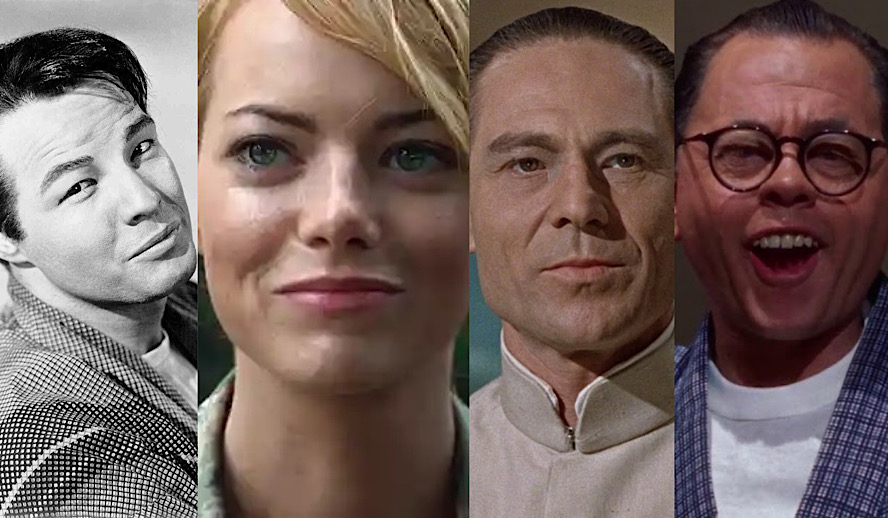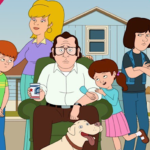Table of Contents

Photo: Marlon Brando as Japanese character, Emma Stone as Asian American, Joseph Wiseman as Chinese-German and Mickey Rooney as Asian
The COVID-19 virus has affected the lives of everyone, that is a certainty. But one of the perhaps unexpected results of the virus’s global takeover of the public consciousness has been an increase in racism directed against people of Asian descent. Violent hate crimes against Asian-Americans in the United States have seen a dramatic uptick, and NBA star Jeremy Lin and Best Actor contender and ‘Minari’ star Steven Yeun have used their respective platforms to discuss their experiences with hate since the initial outbreak in the US.
Related article: How Steven Yeun is Creating a More Authentic, Representation of Asian Americans in Hollywood
Related article: Oscar Buzz: ‘Minari’ is an Incredible Portrait of the Korean-American Experience
With all this discussion around combating these and all other forms of hate having been put into high gear following the Black Lives Matter protests of the past summer, many other prominent figures Hollywood have begun to speak up against hatred, both specific to the Asian and Black communities, as well as other historically-disenfranchised groups. But it seems that some of the responsibility for these rises in race-related crimes has been deflected to an extent, as many of the people in Hollywood who are speaking up now are the very same people who have helped reinforce negative, anti-Asian stereotypes in entertainment. So I’m taking this opportunity to look back at Hollywood’s problematic history in regards to this subject, and hopefully grapple with the long-reaching results of these instances.
Hollywood’s Anti-Asian Sentiments:
“Old” Hollywood: Pre-1969
Before the Manson murders shocked the world and enlightened people to the danger and evil present in Hollywood and elsewhere, Asian characters were often presented as caricatures (as in the infamous “Mr. Wu,” starring Frank Morgan), likely stemming from the prominent anti-Asian sentiments that were commonplace throughout the 20th Century United States. Internment camps for Asian (specifically Japanese) prisoners of war and immigrants were constructed along the West Coast, and further conflicts with Korea and Vietnam would only make the situation worse in future decades.
Subscribe to Hollywood Insider’s YouTube Channel, by clicking here.
Meanwhile, Hollywood was beginning to mature. Films weren’t quite at the level of consciousness of the post-Manson era of “New Cinema” that would arise with the film school director class (George Lucas, Steven Spielberg, Francis Ford Coppola), but they were beginning to show signs of greater thematic interests besides the universal, family-friendly American values that were so present in the Golden Age of Hollywood. Plenty of films prior to this point had horrible Asian caricatures included in them, but these were further mainstreamed by John Wayne’s 1956 war drama “The Conqueror,” in which the strong-jawed, American cowboy played Mongol warrior Genghis Khan in full yellowface.
The film, as is the case with many of Wayne’s work, is deeply racist in its portrayal of white men playing Asian characters, and Wayne’s performance is also just flat-out terrible, as he can’t escape his unmistakable Midwestern accent at all whatsoever. Wayne as an individual has undergone a lot of reappraisal in recent years, himself, with USC’s School of Cinematic Arts removing his exhibit at the college after racist comments Wayne made about Black Americans came back into focus this past summer. Wayne was also a staunch conservative and used his position in the Screen Actors Guild (along with the position of fellow union leader and future President Ronald Reagan) to undergo massive investigations into anyone who didn’t share their divisive political and racial opinions, under the guise of McCarthy-era anti-Communism.
Concurrently, Marlon Brando starred in his own yellowface role that same year, as lead character Sakini in “Tea House of the August Moon.” Shortly after, another prominent franchise (if we are to consider Wayne’s prototypical brand of film as a sort of franchise, which I would argue is the case) would cause controversy with their own instance of yellowface, as the James Bond franchise introduced James Wiseman as mixed-race Chinese villain Julius No in “Dr. No”.
Related article: The Power of Positivity: Ikorodu Bois + Chris Hemsworth + Russo Brothers + Sam Hargrave
Limited Time Offer – FREE Subscription to Hollywood Insider
That film, while it does feature Sean Connery’s 007 at his absolute best, is also deeply racist and problematic, with its depiction of Chinese and Jamaican characters as incredibly offensive stereotypes (not to mention Bond’s repeated questionable behavior towards the film’s female characters, which would certainly not fly in today’s more consent-conscious climate post-Me Too). It’s a film that frankly requires greater examination as a cultural artifact, as I believe it is a perfect encapsulation of everything that was wrong not just with entertainment, but with greater power structures in general during this time period. Dr. No is also reportedly set to make an appearance in this year’s “No Time to Die,” but will likely take on a different form, with Rami Malek now assuming the role.
Post-1969: “New” Hollywood
If the aforementioned films of the bygone “Old” Hollywood era were representative of the more confrontational and overt racism of the time, then the examples present after the fact were similar mirrors of these issues. John Hughes’ 1984 high school comedy “16 Candles” infamously included a prominent Asian caricature in the form Gedde Watanabe’s foreign exchange student Long Duk Dong. The character is often accompanied by the sound of gongs whenever he appears on-screen, and speaks with a heavy accent, making him inseparable from his Asian background, rather than presenting him as a unique or complicated individual in his own right.
It’s mostly played for laughs rather than antagonism, and was by no means a villain in the story, but this sort of role was evidence of the more casual racism of the time period, rather than the angry, directly offensive forms it took in previous films and decades. “16 Candles,” like “Dr. No,” is also deeply problematic in terms of its sexual politics, to the point where both are borderline unwatchable under any circumstance other than critical examination of them as cultural artifacts of the time.
Related article: Hollywood Insider’s CEO Pritan Ambroase: “The Importance of Venice Film Festival as the Protector of Cinema”
Related article: The Masters of Cinema Archives: Hollywood Insider Pays Tribute to ‘La Vie En Rose’, Exclusive Interview with Director Olivier Dahan
These sorts of negative stereotypes would be slowly phased out in the next couple of decades, but marked a clear resurgence in the 2000s during the George W. Bush administration, with Clint Eastwood’s 2008 film “Gran Torino” making for a particularly irresponsible case study. That film follows Eastwood as a Korean War veteran who engages in a turf war of sorts with his Asian neighbors and features numerous instances of Eastwood shouting offensive anti-Asian slurs. The film was critically well-received at the time, but recently, Eastwood’s co-star Bee Yang spoke in an editorial for NBC, accusing the film of mainstreaming anti-Asian racism, and attributing the recent rises in anti-Asian hate crimes to that film and others of its type.
This was not the first time Eastwood has come under fire for his racial and social politics, as Eastwood’s prominent role in conservative politics, his star turn in the “Dirty Harry” franchise and Eastwood’s direction of the instantly controversial film “American Sniper” have all been as contributory towards the rise of mainstream, casual racism (the “Dirty Harry” franchise notably features Eastwood as a “bad cop” who frequently ignores protocol in order to deliver his own brand of street justice, and “American Sniper” featured Bradley Cooper as Chris Kyle, a sniper, and War on Terror advocate whose leanings have been re-evaluated as having Islamophobic tendencies since his death in 2013).
Related article: ‘Parasite’, Bong Joon-ho’s Unstoppable Globally Acclaimed Phenomenon Proves that Foreign Films are Excelling in Hollywood
Related article: The Five Best and Most Influential Asian American Filmmakers in Hollywood
Present Day: Calls for Inclusion
Around the same time as the Oscars came under attack for their appalling lack of Black representation in their voters and nominees, Hollywood A-Lister Scarlett Johansson began receiving backlash for accepting a role in Rupert Sanders’ 2017 remake of the classic 1995 anime film “Ghost in the Shell.” Johansson’s character, Motoko Kusanagi, is Japanese in the original film, and the remake retains the character’s obviously Japanese name, yet the film tapped Johansson to star, who is very clearly not of Asian descent. This brought up many other instances of whitewashing in Hollywood films, such as “Exodus: Gods and Kings,” a polarizing 2014 film directed by Ridley Scott which starred white actors Christian Bale as the Jewish prophet Moses and Sigourney Weaver as Egyptian Queen Cleopatra, despite neither of these historical figures being white Europeans.
All of these films mentioned have done irreparable damage to the Asian communities they represent. The early examples were explicitly racist and very consistent with the culture of the time, but these more recent films really don’t have much of an excuse. There is an increasing number of Asian actors, actresses, and behind-the-camera talent to pull from when dealing with these types of roles (Randall Park’s Jimmy Woo has been an unmissable meme on Tik Tok since his first appearance on “WandaVision”), yet Hollywood has repeatedly engaged in offensive stereotypes and whitewashing as a means to cater to some imaginary audience that thinks Cleopatra needs to be a white lady.
Bong Joon-Ho’s excellent Korean film “Parasite” winning Best Picture, Best Director, and Best Original Screenplay at the 2020 Oscars was an important first step in recognizing these long-standing biases, as was the mainstream box office success of “Crazy Rich Asians,” and the critical success of Lulu Wang’s “The Farewell,” both of which starred Awkwafina, but if Hollywood really wants to do right by Asian people at this important crossroads, then it begins by increasing the number of positive representations of Asian characters on screen and behind the camera.
By Patrick Nash
Click here to read Hollywood Insider’s CEO Pritan Ambroase’s love letter to Black Lives Matter, in which he tackles more than just police reform, press freedom and more – click here.
An excerpt from the love letter: Hollywood Insider’s CEO/editor-in-chief Pritan Ambroase affirms, “Hollywood Insider fully supports the much-needed Black Lives Matter movement. We are actively, physically and digitally a part of this global movement. We will continue reporting on this major issue of police brutality and legal murders of Black people to hold the system accountable. We will continue reporting on this major issue with kindness and respect to all Black people, as each and every one of them are seen and heard. Just a reminder, that the Black Lives Matter movement is about more than just police brutality and extends into banking, housing, education, medical, infrastructure, etc. We have the space and time for all your stories. We believe in peaceful/non-violent protests and I would like to request the rest of media to focus on 95% of the protests that are peaceful and working effectively with positive changes happening daily. Media has a responsibility to better the world and Hollywood Insider will continue to do so.”
More Interesting Stories From Hollywood Insider
– Do you know the hidden messages in ‘Call Me By Your Name’? Find out behind the scenes facts in the full commentary and In-depth analysis of the cinematic masterpiece
– A Tribute To The Academy Awards: All Best Actor/Actress Speeches From The Beginning Of Oscars 1929-2019 | From Rami Malek, Leonardo DiCaprio To Marlon Brando & Beyond | From Olivia Colman, Meryl Streep To Bette Davis & Beyond
– Why Queen Elizabeth II Is One Of The Greatest Monarchs | Her Majesty Queen Elizabeth II of United Queendom of Great Britain & Northern Ireland
– Compilation: All James Bond 007 Opening Sequences From 1962 Sean Connery to Daniel Craig
– In the 32nd Year Of His Career, Keanu Reeves’ Face Continues To Reign After Launching Movies Earning Over $4.3 Billion In Total – “John Wick”, “Toy Story 4”, “Matrix”, And Many More
– Want GUARANTEED SUCCESS? Remove these ten words from your vocabulary| Transform your life INSTANTLY
anti-asian, anti-asian, anti-asian, anti-asian, anti-asian, anti-asian, anti-asian, anti-asian, anti-asian, anti-asian, anti-asian, anti-asian, anti-asian, anti-asian, anti-asian, anti-asian, anti-asian, anti-asian, anti-asian, anti-asian, anti-asian









